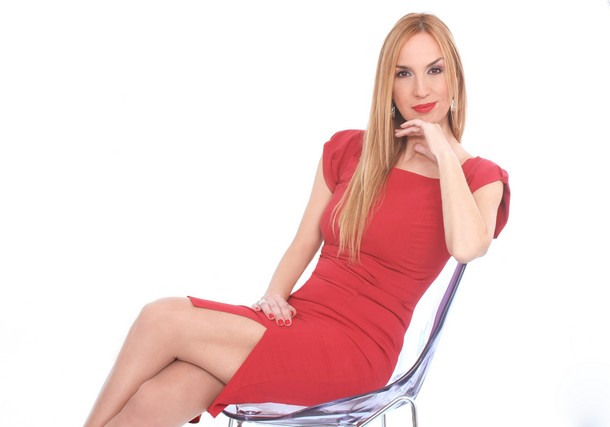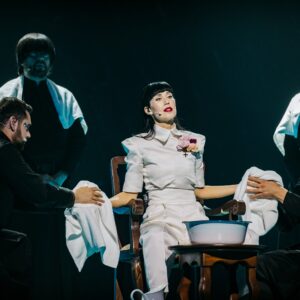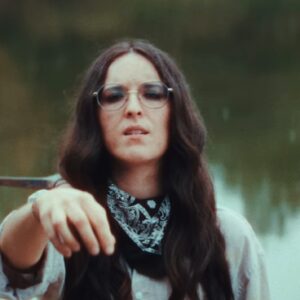As an independent country had its Eurovision debut in 2007, however they also appeared an additional two times in this competition together with Montenegro (in 2004 and 2005) when it was all one country. The person that has been in the team that determined the path of Serbia in Eurovision all along is definitely Duška Vučinić. The viewers who watched the competition via the Serbian national television (RTS) could often hear her voice giving some additional information about the contestants and Eurovision itself in between performances, and naturally how she reminds the diaspora to vote for Serbia. Counting down to Beosong, your favourite Eurovision destination, Eurosong.hr, got an opportunity to talk to Duška about some contest related topics, such as why the show is still top rated in the country.
After several years, Serbia picks its song via a festival again. Why did you choose to return to the festival format?
In the past three years we have found an exceptionally good (at least that’s how it turned out) way to select a Serbian representative for Eurovision. And then at one point it hit us – Serbia wanted a festival because there are none. And when you have a festival like this which is a competition and where you get a winner who will represent you in a prestigious musical competition that is Eurovision, we understood that this was the moment to return to the festival way to select an entry. We were right, seeing as so many composers signed up a total of 171 song out of which a known selection committee picked 15 because that is what we determined with the rules of Beosong.
When the selection committee picked the 15 songs a lot of dust was raised with the authorswhos songs didn’t make it. How do you comment such topics you can find in the press?
There’s nothing for me to comment, it’s always like that. Not just when it’s such a festival but also when you make a movie festival. That’s simply what people do, not just in our country. I communicate with colleagues from other European countries and national broadcasting companies who organize such or similar events. It is simple and normal – the media is dying to get any kind of information. I responsibly claim that here nothing such has been done in that sense.
I assume that you heard some of the songs that will be performed in Beosong. Are you satisfied with the songs picked by the committee?
To be honest, I only went to basic music school and I cannot say that I am a music expert because I handle some other jobs completely different in genre. The songs are very respectable and nice, picked from quality composers. What I’m convinced with is the competence of the people that represented the committee and I’m sure that their selection of the best songs was unmistakable.
Last year the promotion of the song by ŽeljkoJoksimović was mostly based on the internet. What are the plans of RTS for this years’ promotion of the Serbian representative? Are there tours in plan or something similar?
There are two reasons why I’m sure there won’t be any tours. The one is the financial issue, and the other is that practice has shown that it doesn’t contribute much to the one who later presents himself to Europe. I’ve been looking at various European representatives over the years going from one country to the other and then never making it to the final. So, last year I made a suggestion to the Eurovision team that we should try some of the more modern ways to present a song, such as social networks, sending the songs to radio stations, some televisions and such. This turned out to be a lot better. Firstly you save money, secondly you bore no one and thirdly – the song is the one that attracts the audience, not the fact that someone saw you in someone’s morning, daytime or show programme.
It was tradition for the surrounding countries to present their songs during the entertainment part of the show. How will this be in Beosong?
We won’t do that because this year we decided to do something completely different. We will orientate ourselves towards the Serbian talents and something that is recognizably Serbian, but I won’t tell much because it is all still in production.
Since the juries returned to Eurovision Serbia couldn’t adapt for some time. The votes of the jury and the televoting could never be harmonised and the results varied vastly. However you made it with Joksimović in Baku. Has Serbia finally found a recipe to equally impress both the jurors and the televoters? Is there an actual recipe or is luck just a big part of it all?
There is no specific recipe. We thought about it last year and we exchange our experiences with other colleagues from other national broadcasting agencies. You never know, for example, last year a song, which I’m sure five years ago wouldn’t even make it to the final, won. The taste of the audience that likes Eurovision started changing. We started listening to MTV, VH1, started turning towards some other things. The one thing that is certain – if you have a quality vocal performance and a quality ballad you cannot go wrong. Željko was one of the biggest stars in last years’ Eurovision, a man known all over Europe and around the world and he was a good choice.
You’ve been doing this since 2004. How much did the Eurovision Song Contest change meanwhile?
Eurovision changes, we change, tasted change – everything changes. We all grow alongside each other and it seems to me like it’s all right. Younger generations of people are coming to work on these projects and new generations of artists are coming to present their songs.
What do you think it is that attracts millions of viewers to this TV show for almost 6 decades? Why is it that this is the most viewed TV-event after the Olympic games and the World Football Championship?
As soon as you have something like music you have something that is a competition, something that is cheerful and border lining on kitsch in a positive sense, and when you have your representative who isn’t defined by his first and last name but only the name of the country he comes from, you immediately get emotionally attached to that.
What is the difference between the popularity of Eurovision in Serbia today and in 2008. When you were the hosts in Belgrade?
Last year the final in which ŽeljkoJoksimović performed was one of the most viewed programmes in the past year. Eurovision is still popular over here.
What is your favourite Eurovision song?
It was the year 2004, the name of the group was “Athena”, and the song was “For Real”. They represented Turkey. It was a completely fascinating song for me and I still like to listen to it today. It is completely different and doesn’t fit in Eurovision. Other than that it belongs to that certain music style and genre I love.







Još nema komentara. Neka tvoj komentar bude prvi?